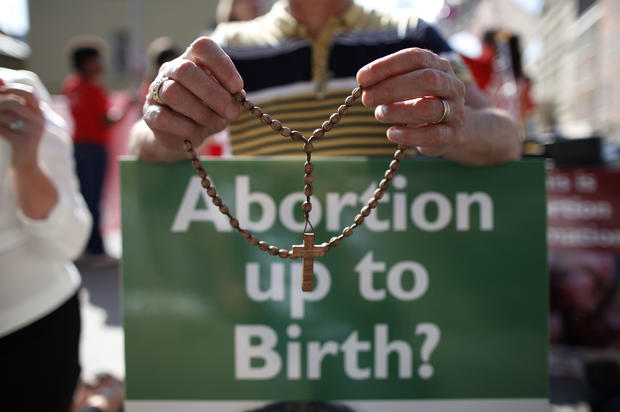Court in Ireland rules on life support for pregnant woman
DUBLIN -- A clinically dead pregnant woman in Ireland was removed from life support Friday after a Dublin court ruled that her 18-week-old fetus was unable to survive until birth. The case highlighted fear and confusion among doctors over how to observe Ireland's ban on abortion, the strictest such law in Europe, in an age of medical innovation.
The three-judge Dublin High Court ruled earlier in the day that all artificial support for the woman should end, more than three weeks after she was declared clinically dead. Relatives of the woman, whose identity was concealed by the court, gathered at a hospital in the Irish Midlands to bid a final farewell.
Lawyers representing the rights of the woman and the unborn child -- who in Ireland has a constitutionally protected right to life -- said they wouldn't appeal the ruling. The court normally shuts during the Christmas period, but convened an extraordinary session to hear pleas from the woman's family for her life-support machines to be shut down.
The woman, whose identity was concealed by the court to protect her privacy, was declared clinically dead Dec. 3 four days after suffering a severe head injury in a fall. The woman, who was in her late 20s with two young children, already had been hospitalized after doctors found a cyst in her brain.
Doctors refused family pleas to turn off life support, citing fears they could be sued for negligence or even face murder charges if they cut life-saving support for the fetus.
In its 29-page judgment, the judges accepted testimony from seven doctors who shared the view that the fetus "has nothing but distress and death in prospect." They detailed how the woman's body was becoming dangerous to the unborn child, with threats from infections, fungal growths, high temperatures and blood pressure combining to ensure that the fetus couldn't survive for another two months, when it might be delivered safely.
However, the judges left open the possibility that future cases involving clinically dead pregnant women might be handled differently -- if the fetus was significantly closer to delivery age. Their judgment emphasized that this fetus couldn't survive even with life support. It noted that legal considerations would have been different had doctors testified that the fetus had a reasonable chance of survival, even at high risk of defects or abnormalities.
It said Ireland's constitutional ban on abortion commits authorities to defend equally the right to life of the mother and unborn child. Given that in such cases the mother is already dead, the judges argued, the rights of the living fetus "must prevail over the feelings of grief and respect for a mother who is no longer living."
Last year, after bitter debate and large demonstrations by activists on both sides, lawmakers amended Ireland's abortion ban to make terminations legal if doctors determine the woman's life is at risk from continued pregnancy.
The amendment had been considered for years but finally passed only after a tragic case thrust the issue into the headlines. In October 2012, an Indian woman in Ireland, Savita Halappanavar, died from blood poisoning linked to her own dying fetus. An Irish hospital had refused her plea for an abortion, citing the fetus' heartbeat.
